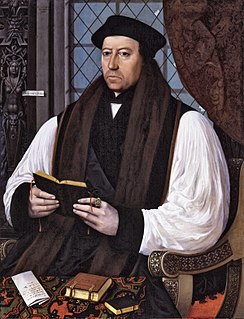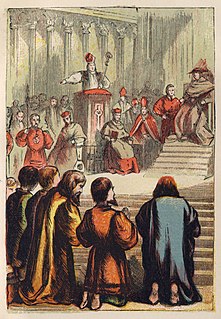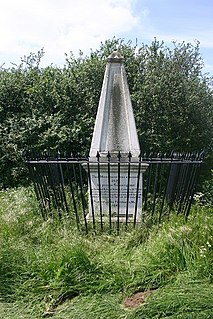Related Research Articles

Thomas Cranmer was a leader of the English Reformation and Archbishop of Canterbury during the reigns of Henry VIII, Edward VI and, for a short time, Mary I. He helped build the case for the annulment of Henry's marriage to Catherine of Aragon, which was one of the causes of the separation of the English Church from union with the Holy See. Along with Thomas Cromwell, he supported the principle of royal supremacy, in which the king was considered sovereign over the Church within his realm.

Matthew Parker was an English bishop. He was the Archbishop of Canterbury in the Church of England from 1559 until his death in 1575. He was also an influential theologian and arguably the co-founder of a distinctive tradition of Anglican theological thought.

Robert Barnes was an English reformer and martyr.

Hugh Latimer was a Fellow of Clare College, Cambridge, and Bishop of Worcester during the Reformation, and later Church of England chaplain to King Edward VI. In 1555 under the Catholic Queen Mary I he was burned at the stake, becoming one of the three Oxford Martyrs of Anglicanism.

Nicholas Ridley was an English Bishop of London. Ridley was burned at the stake as one of the Oxford Martyrs during the Marian Persecutions for his teachings and his support of Lady Jane Grey. He is remembered with a commemoration in the calendar of saints in some parts of the Anglican Communion on 16 October.

Stephen Gardiner was an English Catholic bishop and politician during the English Reformation period who served as Lord Chancellor during the reign of Queen Mary I and King Philip.
John Bell was a Bishop of Worcester (1539–1543), who served during the reign of Henry VIII of England.

The Books of Homilies are two books together containing thirty-three sermons developing the authorized reformed doctrines of the Church of England in depth and detail, as appointed for use in the 35th Article of the Thirty-Nine Articles of Religion. The longer title of the collection is Certain Sermons or Homilies Appointed to Be Read in Churches. They belong to the basic formularies of the Church of England.

Rowland Taylor was an English Protestant martyr during the Marian Persecutions.
Thomas Watson was a Catholic Bishop, notable among Catholics for his descriptions of the Protestant Reformation. Historian Albert Pollard described Watson as "one of the chief Catholic controversialists" of Mary Tudor's reign.

Thomas Bilney was an English Christian martyr.

Robert Ferrar was a Bishop of St David's in Wales.
John Scory was an English Dominican friar who later became a bishop in the Church of England.
Nicholas Shaxton was an English Reformer and Bishop of Salisbury.

George Day was the Bishop of Chichester.

John Forest was an English Franciscan Friar and martyr. Confessor to Queen Catherine of Aragon, Forest was burned to death at Smithfield for heresy, in that he refused to acknowledge the King as head of the church.

The English Reformation took place in 16th-century England when the Church of England broke away from the authority of the pope and the Roman Catholic Church. These events were part of the wider European Protestant Reformation, a religious and political movement that affected the practice of Christianity in western and central Europe.
Richard Nykke became bishop of Norwich under Pope Alexander VI in 1515. Norwich at this time was the second-largest conurbation in England, after London.
John Hilsey was an English Dominican, prior provincial of his order, then an agent of Henry VIII and his church reformation, and Bishop of Rochester.
James Bainham was an English lawyer and Protestant reformer who was burned as a heretic in 1532.
References
- Attribution
![]() This article incorporates text from a publication now in the public domain : "Crome, Edward". Dictionary of National Biography . London: Smith, Elder & Co. 1885–1900.
This article incorporates text from a publication now in the public domain : "Crome, Edward". Dictionary of National Biography . London: Smith, Elder & Co. 1885–1900.
- Bibliography
- Weir, Alison (2001). Henry VIII: King and Court . London.
- Oxford Dictionary of National Biography, Edward Crome, (London 2004)
- Linda Porter, Katherine the Queen, (London 2000)
- Wabuda, Susan (April 1993). "Equivocation and Recantation During the English Reformation: The 'Subtle Shadows' of Dr Edward Crome". The Journal of Ecclesiastical History. 44 (2): 224–242. doi:10.1017/S0022046900015839.